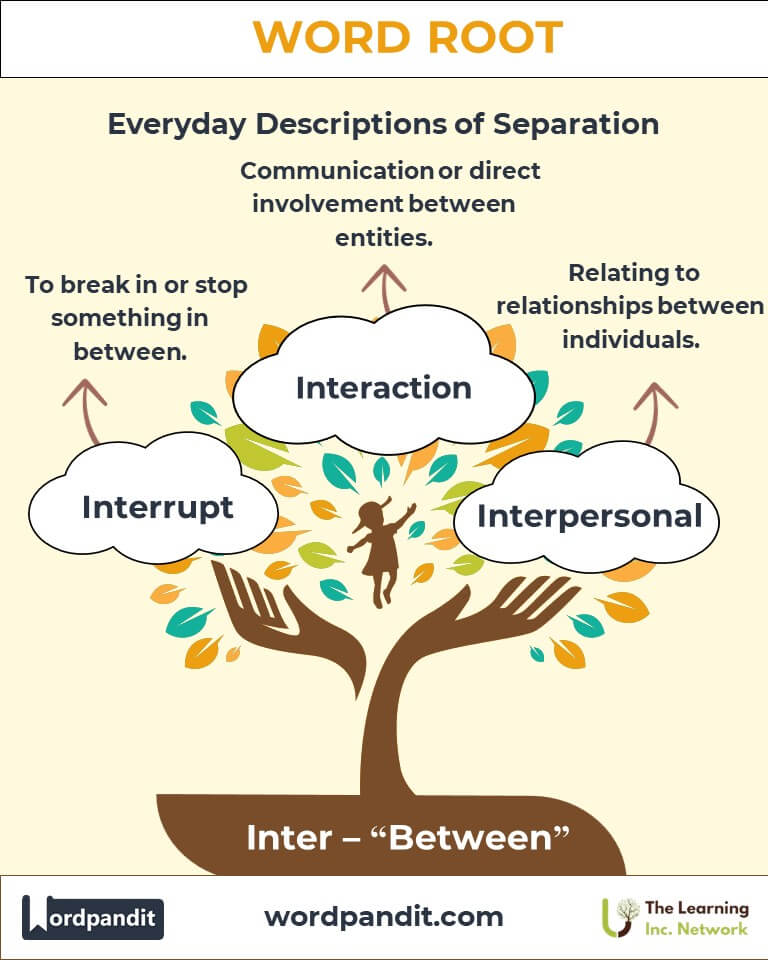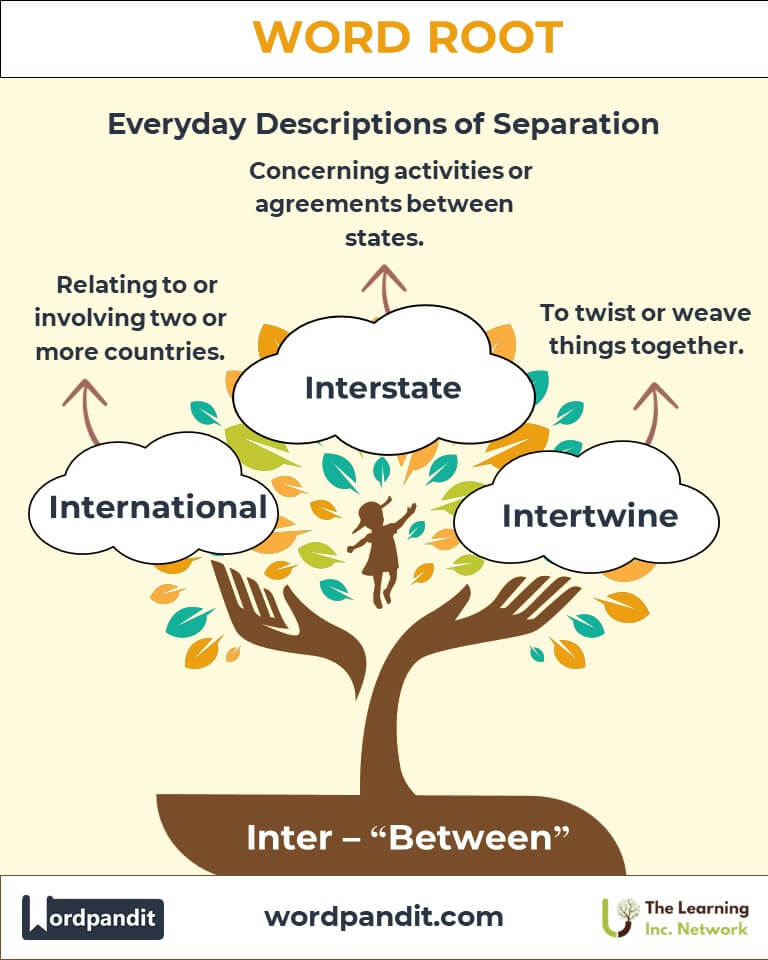Inter: Bridging the In-Between Across Language and Culture
Discover the versatility and depth of the root "inter," derived from Latin, meaning "between" or "among." From words like "interrupt," which denotes breaking in between, to "international," which connects nations, this root plays a vital role in bridging gaps across language, culture, and disciplines.

Table of Contents
- Introduction: The Essence of "Inter"
- Etymology and Historical Journey
- Mnemonic: Unlocking the Power of "Inter"
- Common "Inter"-Related Terms
- "Inter" Through Time
- "Inter" in Specialized Fields
- Illustrative Story: "Inter" in Action
- Cultural Significance of the "Inter" Root
- The "Inter" Family Tree
- FAQs about the "Inter" Root
- Test Your Knowledge: "Inter" Mastery Quiz
- Conclusion: The Living Legacy of "Inter"
Introduction: The Essence of "Inter"
Imagine a bustling airport where travelers from all over the world converge. The root "inter" beautifully captures this idea of connection and interaction. Pronounced "in-ter," this root, derived from Latin, means "between" or "among." It appears in a myriad of words that emphasize relationships, transitions, and connections. From "interrupting" a conversation to "international" diplomacy, "inter" bridges divides, fostering understanding and collaboration across diverse realms.

Etymology and Historical Journey
The word root "inter" originates from classical Latin, where it meant "between" or "among." Over centuries, as Latin influenced English, "inter" became a linguistic cornerstone. It seamlessly merged with other roots to create words that describe relationships and intersections in social, geographical, and abstract contexts. Notable historical influences include the Roman emphasis on interconnectedness, evident in phrases like "inter regna" (between kingdoms), which inspired modern terms like "interstate."
Mnemonic: Unlocking the Power of "Inter"
To easily remember the meaning of "inter," visualize a bridge spanning two islands. The bridge symbolizes "inter," connecting spaces and facilitating movement between them.
Mnemonic Device:
“Inter is the bridge that connects between ideas, people, and places.”
Common "Inter"-Related Terms
- Interrupt (in-ter-rupt): To break in or stop something in between.
Example: The speaker was interrupted by a sudden loud noise. - International (in-ter-na-shuh-nal): Relating to or involving two or more countries.
Example: The international conference brought together leaders from across the globe. - Interaction (in-ter-ak-shun): Communication or direct involvement between two or more entities.
Example: The teacher encouraged interaction between students to foster teamwork. - Intermediate (in-ter-mee-dee-it): Being in the middle of two stages or levels.
Example: The course was designed for intermediate learners. - Intertwine (in-ter-twine): To twist or weave things together.
Example: The stories of the two families intertwined over generations. - Intercept (in-ter-sept): To seize or stop something on its way.
Example: The defender intercepted the ball before it reached the goal.
"Inter" Through Time
- Interrex (Ancient Usage): Meaning "between kings," this term described a temporary ruler during interregnums in ancient Rome.
- Interconnect (Modern Evolution): Evolving with technological advancements, this word describes linking systems like the internet, highlighting the root’s adaptability.
- Interpersonal (Contemporary Focus): Reflecting modern emphasis on human relations, this term captures "inter's" essence in emotional and social contexts.
"Inter" in Specialized Fields
- Technology: Internet: A global network of interconnected systems.
Importance: Demonstrates the root’s role in linking individuals and information worldwide. - Medicine: Intercellular: Occurring between cells.
Application: Understanding intercellular communication is vital in studying diseases like cancer. - Law: Interstate: Relating to activities or agreements between states.
Significance: Governs trade and legal interactions across state borders in the U.S. - Sociology: Interpersonal: Concerning relationships between individuals.
Impact: Essential in understanding social dynamics and communication.
Illustrative Story: "Inter" in Action
In a small international town, a young journalist named Maya was covering an interaction between two rival communities. Through her intermediate position as an unbiased observer, she intercepted misunderstandings and helped the groups intertwine their shared histories. Her efforts not only interrupted a potential conflict but also built lasting bridges of understanding, exemplifying the power of "inter" in uniting divides.
Cultural Significance of the "Inter" Root
The "inter" root symbolizes humanity’s innate desire for connection. In culture, it manifests in festivals that celebrate international unity, like the Olympics. Literature often uses "inter" themes to explore relationships, such as intergenerational bonds in family sagas. The root underscores global interdependence, reminding us that collaboration is key in an interconnected world.

The "Inter" Family Tree
Related Prefixes and Roots:
- Intra- (Meaning: Within):
- Example: Intramural (within the walls).
- Trans- (Meaning: Across):
- Example: Transport (carry across).
- Con- (Meaning: Together):
- Example: Connect (link together).
- Dia- (Meaning: Through):
- Example: Dialogue (conversation through words).

FAQs About the "Inter" Root
Q: What does "inter" mean?
A: The root "inter" means "between" or "among." It is used to describe relationships, connections, or interactions that exist between two or more entities. For instance:
- "International" refers to relations between nations.
- "Interaction" pertains to communication between people or groups.
Q: Is "inter" always a prefix?
A: Yes, "inter" functions primarily as a prefix in English. It is added to other roots or words to create terms that emphasize "between" or "among." For example, in "interrupt," it combines with "rupt" (break) to mean "break in between."
Q: How does "inter" differ from "intra"?
A: While "inter" means "between" or "among" (e.g., international – between nations), "intra" means "within" (e.g., intramural – within the walls). These prefixes highlight contrasting ideas of external (inter) versus internal (intra) connections or boundaries.
Q: What does "intercept" mean, and where is it used?
A: To "intercept" means to stop, seize, or block something on its way from one point to another. It is commonly used in sports (e.g., intercepting a ball), military contexts (e.g., intercepting enemy communication), and daily life when someone interrupts or stops a message or action mid-way.
Q: What is the significance of "inter" in technology?
A: In technology, "inter" denotes connectivity and interaction between systems or networks. The term "internet" is an excellent example, where "inter" signifies the global network linking computers and devices worldwide.
Q: How does "interpersonal" relate to human connections?
A: "Interpersonal" refers to relationships or communication between individuals. It is vital in social sciences and psychology to study how people interact, resolve conflicts, and build connections within communities or organizations.
Q: What is an "intermediate" level, and why is it important?
A: "Intermediate" describes something that lies between two stages or levels. For example, intermediate learners are those who are neither beginners nor experts but are progressing toward advanced knowledge or skills. It plays a significant role in education and training by providing tailored resources for this middle stage.
Q: What does "intertwine" mean in abstract and physical contexts?
A: To "intertwine" means to twist or weave together. Physically, it can describe threads or vines that are intertwined. Abstractly, it refers to complex relationships or narratives, such as the intertwining of two families’ histories.
Test Your Knowledge: "Inter" Mastery Quiz
1. What does "inter" mean?
2. Which word describes communication between people?
3. What is the meaning of "interrupt"?
4. Which term refers to connections between nations?
5. What does "intertwine" describe?
Conclusion: The Living Legacy of "Inter"
The root "inter" is a cornerstone of language, embodying connection and interaction. It reflects humanity’s progress in building bridges—whether physical, emotional, or intellectual. As our world becomes increasingly interconnected, "inter" reminds us of the importance of collaboration and understanding. Let "inter" inspire you to bridge divides and foster connections wherever life takes you.














